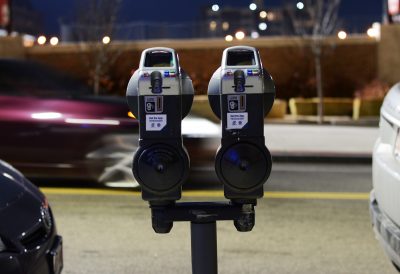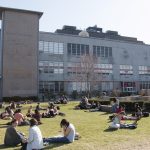
A one-year parking pilot program that examines the relationship between the price and the demand of parking in Boston will launch at the beginning of 2017 by the Mayor’s Office of New Urban Mechanics, the Boston Transportation Department and the Department of Innovation and Technology, according to a press release issued by Mayor Martin Walsh’s office on Thursday.
As part of the study, the City of Boston will adjust meter rates in Back Bay and Seaport neighborhoods to determine how parking meter rates can reduce both street congestion and the search time for a parking space, according to the release.
The pilot was developed over the course of the past year, and it is a joint effort between the City of Boston and nonprofit group A Better City, which conducted the study on the future of parking in Boston, Richard Dimino, president and CEO of A Better City, said in the release.
“[We] examined existing conditions of parking in Boston as well as reviewed best practices from around the nation to help improve the parking system for residents, visitors and the business community,” Dimino said. “[The pilot] is based on proven strategies that should make parking more available while implementing a flexible pricing model.”
In an email to The Daily Free Press, Chief of Streets Chris Osgood elaborated on how the study will be conducted.
“In the Back Bay, meter prices will be raised to $3.75 per hour,” Osgood wrote. “Over the course of the pilot program, data will be collected on parking patterns on each block of the pilot area to measure how parking occupancy changes with this adjustment in price. In Seaport, parking meter sensors will be used and parking prices will be adjusted based on parking occupancy and parking spot location.”
The city expects that the program will result in variety of changes for drivers, Osgood wrote.
“By balancing the price of metered parking with the price of parking in an off-street parking garage, long-term drivers will be encouraged to park in garages or seek other forms of transportation,” Osgood wrote. “We expect that it will be less challenging for drivers to find an available parking meter … this will result in less congestion from vehicles.”
Although the pilot is not associated with Boston University, there is limited space for parking in Boston, and the cost of parking at BU is less expensive than in areas outside of campus, BU spokesperson Colin Riley said.
“There’s limited space in the capital city of the Commonwealth of Massachusetts, and parking is at a premium so the cost actually at BU, is probably less than it is in other areas of the city,” Riley said.
Several residents expressed varying opinions on the parking pilot program.
Linda Keavany, 56, of Fenway, said that before they proceed, officials should conduct a survey among residents who would be affected by the program.
“Considering that [residents] think everything is expensive here, then yes, I think they probably will have a problem with the meter [rates increasing],” Keavany said. “I think they should send out a survey earlier to ask what they think about the rates being raised.”
Thomas Cater, 26, of Dorchester, said the possible positive outcomes of the program make its implementation worthwhile.
“[The parking pilot program] will be helpful,” Cater said. “There will be a lot more parking available. Raising the rates may upset residents, but it will definitely still be worth it.”
Jesse Lauden, 28, of Brighton, said he believes the program will ultimately be beneficial, as he often encounters many of the issues it is trying to alleviate.
“I find that, generally, Boston has a moderate amount of street congestion based on Ubers, taxis and people constantly looking for parking,” Lauden said. “It’s a relatively dense, small urban area in the actual downtown, so I would say it’s an issue. I think most people who drive in Boston would agree that if someone is trying to make parking easier, they’re going to be everyone’s best friend.”




